How to deal with your debt when it gets out of hand
It’s easy to accumulate debt. Credit cards, store cars, car loans and overdrafts. Before you know it your non-mortgage debt can creep up to a scary amount.
It’s easy to feel silly, overwhelmed or embarrassed about debt. But the simple fact is as humans we aren't wired to be naturally good with money. Our brain has developed at a much slower pace than the world around us, with its temptations and electronic money.
But you don’t have to suffer in silence - you aren’t alone, and help is out there.
The first step is recognising that things are getting out of hand, and the second step is knowing who can help you.
Understanding your situation
Take stock of how much you owe, and how much of this debt you can afford to repay. Essentially, you need to figure out your outgoings compared to your income. Knowing exactly where you stand will aid any conversations you have with the people who are going to help you get things under control.
Speak to your lenders
Most people who are struggling to repay their debt think that owning up to their lender is the worst thing to do. However, lenders deal with people in this situation everyday. If you feel as though you're falling behind, and you're worried that you might miss a payment or default then it's a good idea to give your lender pre-warning. There are steps they might be able to take in terms of rearranging the terms of your loan to help make things more affordable. Preventative action is always easier than trying to find a cure.
Seek professional help
There are a number of charities who offer free, professional debt counselling. They can get to know your personal circumstances, and help you decide on the best course of action. They're particularly helpful if you feel under a lot of pressure from your lender or from debt collection agencies. Provided you've sought help from one of these debt counselling services, then there is a Code of Practice which means that debt collectors will be ordered to leave you alone for 30 days with no contact.
It can give you the breathing room you need to get your action place together. During this period you can work with the service to negotiate payment freezes and debt management plans with your lender, or they may recommend whether an IVA, DRO or Bankruptcy are suitable options.
Take a look at:
Don't be nervous about asking for help. These are trained professionals who are paid to get you back on track by finding the best solution for you. If you need help, reach out, and hopefully you should be able to get a clearer view on where you stand and how to start working towards being debt free!
Sign up to our newsletter
Our newsletters bring you the latest articles to help you improve your financial wellbeing.
If you want to consent to receiving our newsletter please enter your email below to subscribe. If at any point you want to withdraw your consent please email hello@salaryfinance.com. For more information about how we use your personal data see our privacy notice.



